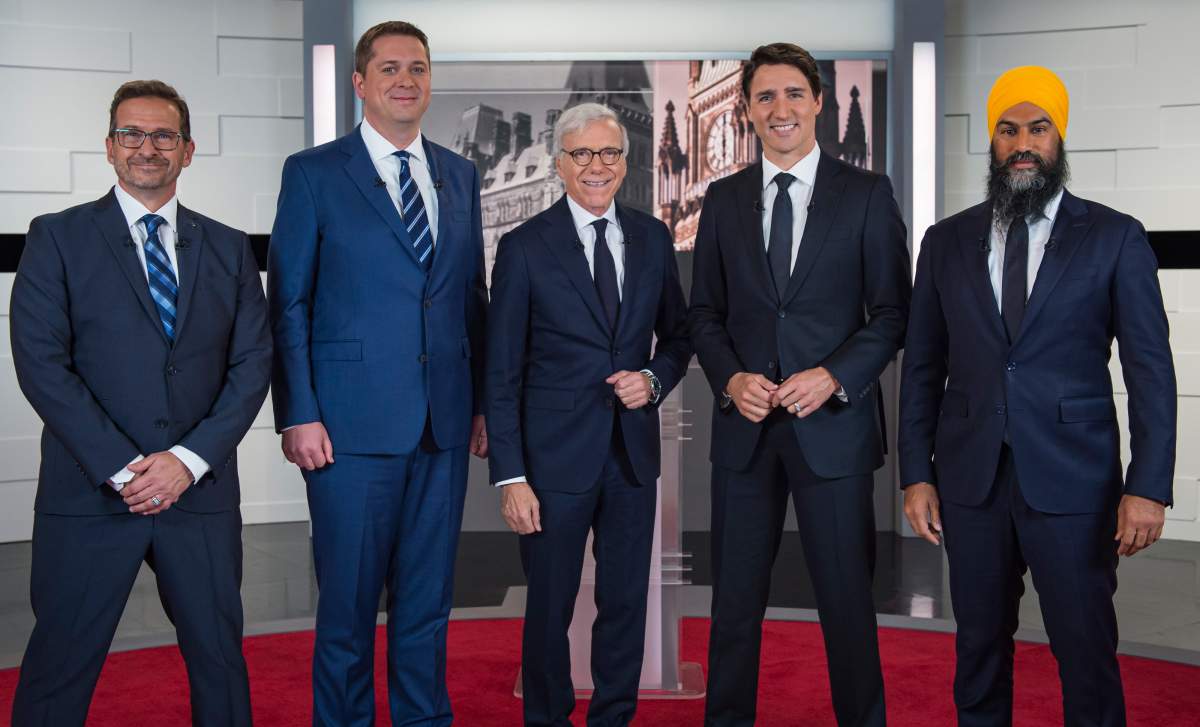On Wednesday night, TVA presented the debate between the federal leaders in French. It was two hours with an additional hour of commentary — a bit of a snore.

The debate was important because, for both the Liberal Party and the Conservative Party, winning seats in the province of Quebec could mean the difference between a minority and a majority government. For the NDP, there are 14 seats in Quebec that would be nice to keep in order to avoid a predicted downfall. The Bloc Québécois is hoping to re-emerge from its irrelevance to again become the traditional voice for Quebec voters.
READ MORE: Federal party leaders hope to gain Quebec votes in French-language debate
No one really lost the debate. Although the TVA analysts panned Conservative Leader Andrew Scheer, his calm demeanour presented a reassuring alternative to people who fear deficits and extra spending without wanting to know too much about politics. However, the Conservatives’ lack of a credible environmental platform is a turnoff for many Quebec voters.
Jagmeet Singh, leader of the NDP, was his authentic self, more charismatic and convincing than he had been at the beginning of the campaign. He seemed to be growing in confidence throughout the debate. He might be able to save a few of his Quebec NDP colleagues from defeat.

But the real debate was between Liberal Leader Justin Trudeau and Yves-François Blanchet, the new leader of the Bloc Québécois. Blanchet is an experienced politician, though little-known as a leader, and served as a minister under a provincial Parti Québécois government.

Get daily National news
Interestingly, he presented himself as the “natural“ leader for Quebec, the anointed partner to Premier François Legault, pontificating and giving lessons to his colleagues. He even criticized the legitimacy of federal parties disagreeing with a Quebec premier, even if the essence of federalism is to allow voters to elect one type of government in their province and another party federally. His self-confidence will have been offputting for some, but it had the familiar tones of a Quebec politician: an old script, predictable in its tenor with the expectable outrages and complaints, bringing in the ghost of Legault at every corner.
Trudeau, who, as the incumbent, should have been the target of criticism, was left relatively unscathed. His performance was also predictable: a defence of a progressive Canada but not in any rush to deliver too fast and a defence of his record on NAFTA, Indigenous relations and the environment.
Interestingly, the debate did not really touch on foreign policy. Instead, it focused on social issues, where it is easier for the Bloc to defend provincial jurisdiction. The choice of subjects in itself defined the debate as a Quebec-versus-Canada debate and was a gift to the Bloc. This was unfortunate.
Federal politics should at least include a discussion of our defence and foreign relations. It seems even journalists have given up on Canada’s role in the world and forget that this is one of the most important functions of the federal government.
We may have returned to the old-style politics in Quebec: disengaged Quebecers focusing on their own province rather than the country and electing Bloc Québécois MPs as their way to express their inchoate disappointment with a Liberal government.
It is too early to see whether the debate will have moved voters in any way, but we feel that we have seen this movie before.
Nathalie Des Rosiers is principal of Massey College at the University of Toronto. She was Liberal MPP for Ottawa-Vanier in the Ontario legislature from 2016 to 2019.







Comments
Want to discuss? Please read our Commenting Policy first.